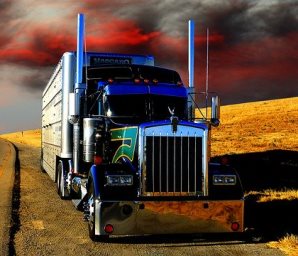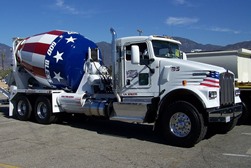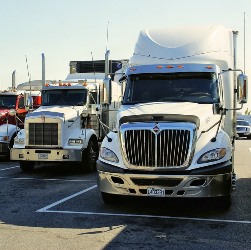How to Enroll in the Right CDL Driving School near San Francisco California
 Congratulations on your decision to become a truck driver and enroll in a CDL school near San Francisco CA. Perhaps it has always been your goal to hit the open highway while driving a huge tractor trailer. Or perhaps you have done some research and have discovered that a career as a truck driver offers excellent wages and flexible work prospects. Whatever your reason is, it's important to obtain the appropriate training by selecting the right CDL school in your area. When assessing your options, there are several variables that you'll need to examine prior to making your final choice. Location will no doubt be an issue, especially if you need to commute from your San Francisco residence. The cost will also be of importance, but picking a school based only on price is not the ideal way to make certain you'll obtain the right education. Don't forget, your goal is to learn the skills and knowledge that will enable you to pass the CDL exams and become a qualified truck driver. So keeping that goal in mind, just how do you decide on a truck driving school? The answer to that question is what we are going to address in the balance of this article. But first, we are going to talk a little bit about which commercial driver's license you will ultimately need.
Congratulations on your decision to become a truck driver and enroll in a CDL school near San Francisco CA. Perhaps it has always been your goal to hit the open highway while driving a huge tractor trailer. Or perhaps you have done some research and have discovered that a career as a truck driver offers excellent wages and flexible work prospects. Whatever your reason is, it's important to obtain the appropriate training by selecting the right CDL school in your area. When assessing your options, there are several variables that you'll need to examine prior to making your final choice. Location will no doubt be an issue, especially if you need to commute from your San Francisco residence. The cost will also be of importance, but picking a school based only on price is not the ideal way to make certain you'll obtain the right education. Don't forget, your goal is to learn the skills and knowledge that will enable you to pass the CDL exams and become a qualified truck driver. So keeping that goal in mind, just how do you decide on a truck driving school? The answer to that question is what we are going to address in the balance of this article. But first, we are going to talk a little bit about which commercial driver's license you will ultimately need.
Which CDL Should You Get?

In order to operate commercial vehicles legally within the USA and San Francisco CA, an operator needs to obtain a CDL (Commercial Driver's License). The three license classes that one can apply for are Class A, Class B and Class C. Given that the subject of this article is how to select a truck driving school, we will discuss Class A and B licenses. What differentiates each class of CDL is the type of vehicle that the driver can operate as well as the GVWR (Gross Vehicle Weight Rating) or GCWR (Gross Combination Weight Rating). Following are short explanations for the 2 classes.
Class A CDL. A Class A Commercial Drivers License is required to drive any vehicle that has a GCWR of greater than 26,000 lbs., including a towed vehicle of more than 10,000 lbs. A few of the vehicles that operators may be able to drive with Class A licenses are:
- Interstate or Intrastate Tractor Trailers
- Trucks with Double or Triple Trailers
- Tanker Trucks
- Livestock Carriers
- Class B and Class C Vehicles
Class B CDL. A Class B CDL is needed to drive single vehicles having a GVWR of greater than 26,000 lbs., or a GCWR of greater than 26,000 lbs. including a towed vehicle weighing up to 10,000 lbs. Several of the vehicles that drivers may be qualified to operate with Class B licenses are:
- Tractor Trailers
- Dump Trucks
- Cement Mixers
- Large Buses
- Class C Vehicles
Both Class A and Class B CDLs may also require endorsements to operate certain types of vehicles, for instance school or passenger buses. And a Class A licensee, with the proper needed endorsements, can operate any vehicle that a Class B licensee is authorized to drive.
How to Evaluate a CDL School

When you have decided which Commercial Drivers License you wish to pursue, you can start the undertaking of assessing the San Francisco CA trucking schools that you are looking at. As already discussed, cost and location will certainly be your initial concerns. But it can't be emphasized enough that they must not be your sole considerations. Other issues, for example the experience of the instructors or the reputations of the schools are similarly or even more important. So following are some more things that you should research while performing your due diligence prior to selecting, and particularly paying for, your truck driving training.
Are the Schools Accredited or Certified ? Very few truck driver schools in the San Francisco CA area are accredited due to the stringent process and cost to the schools. On the other hand, certification is more common and is offered by the Professional Truck Driver Institute (PTDI). A school is not obligated to become certified, but there are certain advantages. Prospective students recognize that the training will be of the highest standard, and that they will receive plenty of driving time. As an example, PTDI calls for 44 hours of actual driving time, not simulations or ride-alongs. So if a school's course is certified (the course, not the school is certified), students know that the training and curriculum will fulfill the very high benchmarks set by PTDI.
How Long in Business? One indicator to help measure the quality of a trucking school is how long it has been in operation. A negatively ranked or a fly by night school normally will not be in business very long, so longevity is a plus. Having said that, even the best of San Francisco CA schools had to begin from their opening day of training, so use it as one of several qualifiers. You can also find out what the school's track record is pertaining to successful licensing and employment of its graduates. If a school won't share those numbers, look elsewhere. The schools should additionally have relationships with regional and national trucking companies. Having numerous contacts not only affirms a quality reputation within the profession, but also bolsters their job placement program for graduates. It also wouldn't be a bad idea to get in touch with the California licensing authority to confirm that the CDL trucking schools you are researching are in good standing.
How Effective is the Training? At a minimum, the schools should be licensed in California and employ instructors that are experienced and trained. We will discuss more about the instructors in the following segment. In addition, the student to instructor ratio should be no greater than 4 to 1. If it's any greater, then students will not be getting the personal instruction they will need. This is particularly true regarding the one-on-one instruction for behind the wheel training. And watch out for any school that professes it can teach you to be a truck driver in a comparatively short time frame. Training to be a truck driver and to drive a tractor trailer skillfully requires time. The majority of San Francisco CA schools provide training courses that run from 3 weeks to as long as two months, based on the class of license or type of vehicle.
How Good are the Instructors? As previously stated, it's important that the instructors are qualified to teach driving methods and experienced as both drivers and instructors. Although a number of states have minimum driving time criteria to be certified as a teacher, the more professional driving experience a teacher has the better. It's also important that the instructors keep up to date with industry advancements or any new laws or changes in regulations. Assessing teachers may be a little more intuitive than other criteria, and perhaps the ideal approach is to check out the school and speak with the teachers face to face. You can also talk to some of the students going through the training and find out if they are satisfied with the quality of instruction and the teacher's qualification to train them.
Adequate Driving Time? Above all else, a good truck driving school will furnish sufficient driving time to its students. Besides, isn't that what it's all about? Driving time is the real time spent behind the wheel driving a truck. While the use of simulators and ride-a-longs with other students are important training methods, they are no substitute for real driving. The more instruction that a student gets behind the wheel, the better driver she or he will become. And even though driving time can vary among schools, a reasonable standard is a minimum of 32 hours. If the school is PTDI certified, it will provide no less than 44 hours of driving time. Get in touch with the San Francisco CA schools you are considering and find out how much driving time they furnish.
Are they Captive or Independent ? It's possible to obtain discounted or even free training from certain truck driving schools if you enter into an agreement to be a driver for a specific carrier for a defined time period. This is what's known as contract training, and the schools that provide it are called captives. So rather than having relationships with numerous trucking lines that they can place their graduates with, captives only work with one company. The tradeoff is receiving less expensive or even free training by surrendering the flexibility to initially be a driver wherever you choose. Clearly contract training has the potential to restrict your income prospects when beginning your new career. But for some it may be the only way to receive affordable training. Just make sure to find out if the San Francisco CA schools you are contemplating are captive or independent so that you can make an informed decision.
Offer Onsite CDL Testing? There are a number of states that will permit 3rd party CDL testing onsite of trucking schools for its grads. If onsite testing is allowed in California, find out if the schools you are considering are DMV certified to provide it. One advantage is that it is more accommodating than competing with graduates of other schools for test times at California testing locations. It is also an indication that the DMV considers the authorized schools to be of a superior quality.
Are the Classes Flexible? As previously mentioned, truck driving training is only about 1 to 2 months in length. With such a short term, it's important that the San Francisco CA school you enroll in offers flexibility for both the curriculum and the scheduling of classes. For example, if you're having a hard time learning a particular driving maneuver, then the teacher should be willing to spend more time with you until you are proficient. And if you're still holding a job while going to training, then the class scheduling must be flexible enough to accommodate working hours or other responsibilities.
Is Job Placement Provided? Once you have attained your CDL license after graduating from trucking school, you will be impatient to begin your new profession. Make sure that the schools you are looking at have job placement programs. Ask what their job placement rate is and what average salary their graduates start at. Also, find out which local and national trucking companies their graduates are placed with for hiring. If a school has a lower job placement rate or not many San Francisco CA employers hiring their grads, it might be a sign to look elsewhere.
Is Financial Assistance Given? Truck driver schools are similar to colleges and other San Francisco CA area trade or technical schools when it comes to loans and other forms of financial assistance being available. Find out if the schools you are reviewing have a financial assistance department, or at least someone who can help you get through the options and forms that must be submitted.
Find Out More About San Francisco Trucking Schools
Choose the Right San Francisco CA CDL Training
Selecting the ideal truck driving school is an essential first step to starting your new vocation as a local or long distance truck driver. The skills taught at school will be those that mold a new career behind the wheel. There are a number of options available and understanding them is critical to a new driver's success. But first and foremost, you must receive the proper training in order to operate a big commercial vehicle in a safe and professional manner. If you are lacking funds or financing, you might need to consider a captive school. You will pay a lower or in some cases no tuition in exchange for driving for their contracted carrier. Or you can choose an independent trucker school and have the the freedom to drive for the trucking company of your choice, or one of several associated with the school. It's your choice. But no matter how you get your training, you will soon be part of a profession that helps our country move as a professional trucker in San Francisco CA.
